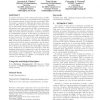Free Online Productivity Tools
i2Speak
i2Symbol
i2OCR
iTex2Img
iWeb2Print
iWeb2Shot
i2Type
iPdf2Split
iPdf2Merge
i2Bopomofo
i2Arabic
i2Style
i2Image
i2PDF
iLatex2Rtf
Sci2ools
118
click to vote
IDEAS
2009
IEEE
2009
IEEE
A cluster-based approach to XML similarity joins
A natural consequence of the widespread adoption of XML as standard for information representation and exchange is the redundant storage of large amounts of persistent XML documents. Compared to relational data tables, data represented in XML format can potentially be even more sensitive to data quality issues because structure, besides textual information, may cause variations in XML documents representing the same information entity. Therefore, correlating XML documents, which are similar in content an structure, is a fundamental operation. In this paper, we present an effective, flexible, and high-performance XML-based similarity join framework. We exploit structural summaries and clustering concepts to produce compact and high-quality XML document representations: our approach outperforms previous work both in terms of performance and accuracy. In this context, we explore different ways to weigh and combine evidence from textual and structural XML representations. Furthermore, w...
Database | IDEAS 2009 |
| Added | 24 May 2010 |
| Updated | 24 May 2010 |
| Type | Conference |
| Year | 2009 |
| Where | IDEAS |
| Authors | Leonardo Ribeiro, Theo Härder, Fernanda S. Pimenta |
Comments (0)

